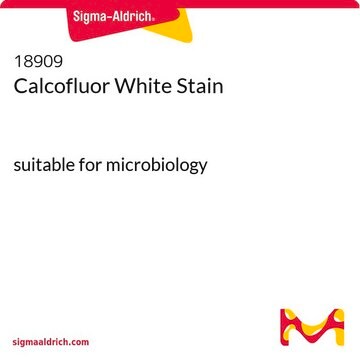Formulation 41325 contains carmine (1 g), aluminum chloride (0.5 g), and water (2 ml). On the other hand, the formulation for HT3018 consists of certified carmine (10 g/L), aluminum hydroxide (10 g/L), and aluminum chloride (5 g/L) in ethanol (50% w/v), following Southgate's modification of Mayer's mucicarmine procedure. Dilution instructions for use are provided, indicating the need to dilute product 41325 with either 10 volumes of distilled water or preferably 50-70% alcohol just before use.
41325
Mayer′s Mucicarmine Stain Solution
for microscopy
Synonym(s):
Mucicarmine Stain Solution according to Mayer
Select a Size
About This Item
Recommended Products
grade
for microscopy
Quality Level
product line
BioChemika
form
liquid
shelf life
limited shelf life, expiry date on the label
technique(s)
microbe id | staining: suitable
application(s)
food and beverages
hematology
histology
storage temp.
room temp
suitability
fungi
General description
Components
Carmine 1 g, Aluminum chloride 0.5 g, water 2 ml
Signal Word
Danger
Hazard Statements
Precautionary Statements
Hazard Classifications
Eye Dam. 1 - Skin Corr. 1B
Supplementary Hazards
Storage Class Code
8B - Non-combustible corrosive hazardous materials
WGK
WGK 1
Flash Point(F)
Not applicable
Flash Point(C)
Not applicable
Personal Protective Equipment
Choose from one of the most recent versions:
Already Own This Product?
Find documentation for the products that you have recently purchased in the Document Library.
Customers Also Viewed
-
Please provide the protocol for histology
1 answer-
Helpful?
-
-
What is the Protocol for using Mayers Mucicarmine 41325 for staining fungi?
1 answer-
Mayer's Mucicarmine Stain Solution is used to detect epithelial mucins and mucins secreting adendocarcinomonas and to demonstrate Cryptococcus neoformans and other fungi. The staining procedure involves placing a drop of the solution on a clean slide, then preparing and observing the stained fungal culture under a microscope.
Helpful?
-
Active Filters
Our team of scientists has experience in all areas of research including Life Science, Material Science, Chemical Synthesis, Chromatography, Analytical and many others.
Contact Technical Service











